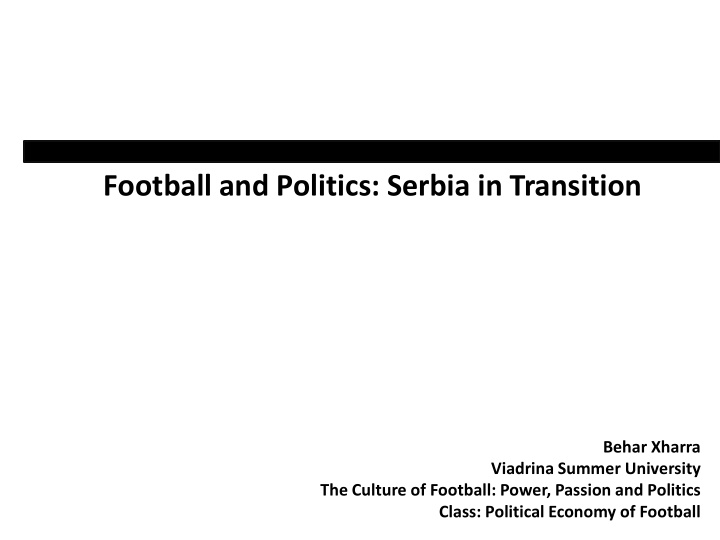



Football and Politics: Serbia in Transition Behar Xharra Viadrina Summer University The Culture of Football: Power, Passion and Politics Class: Political Economy of Football
Football and Politics: Serbia in Transition THE STORY OF WAR From Football Fields to War Battles: The Story of Arkan, Delije and Tigers Reputation building and FC Obilic http://en.wikipedia.org/wiki/File:%C5%BDeljko_Ra%C5%BEnatovi%C4%87.jpg See movie from 6:00 – 8:00 at: http://www.youtube.com/watch?v=z1DsSsKPrmM
Football and Politics: Serbia in Transition INTERNATIONAL POLITICS United Nations Security Council Resolution 757 , adopted on May 30, 1992… the Council condemned the failure of the authorities in the Federal Republic of Yugoslavia (Serbia and Montenegro) to implement Resolution 752. (g) limit participation in sporting events in the country;… The Council further decided that the sanctions should.. UN SC Resolution 757: http://www.un.org/documents/sc/res/1992/scres92.htm http://www.totalprosports.com/2011/06/27/this-day-in-sports-history-june-27th-denmark- soccer/
Football and Politics: Serbia in Transition POLITICS FROM THE PITCH "Peace, not War" - unique message of the Italian Lazio players Sinisa Mihajlovic and Dejan Stankovic before the game Lazio-Milan “Yugoslav football player Zoran Mirkovic protests against the NATO aggression wearing T-shirt saying in Italian "Peace, no War" as he sits on the bench of the Juventus Torino” http://www.arhiva.serbia.gov.rs/news/1999-06/08/12425.html
Football and Politics: Serbia in Transition NATIONALISM FROM THE STANDS http://www.supersport.com/football/european-championships/news/101013/Platini_Blatter_condemn_Serbian_hooligans http://www.msnbc.msn.com/id/23277147/ns/world_news-europe/t/protesters-burn-us-embassy-serbia/#.T9fd6bVSTEU
Football and Politics: Serbia in Transition HOOLIGANISM Hooligans or Gangsters? ~ Wikileaks cable …a mix of ‘football toughs’ and organized crime elements. ~ Burning of the US Embassy “…organized crime is behind the hooligans who aim to destabilize the state due to government’s actions in prosecuting mafia bosses .” ~ Boris Tadic, President of Serbia http://www.cablegatesearch.net/cable.php?id=09BELGRADE1266 http://www.msnbc.msn.com/id/23277147/ns/world_news-europe/t/protesters-burn-us-embassy- http://www.mediabistro.com/tvnewser/soccers-growing-hooligan-problem_b86401 serbia/#.T9fd6bVSTEU
Football and Politics: Serbia in Transition MONEY MARKET, HIDDEN TRANSACTIONS During the international embargo on Yugoslavia in early 1990s, football was used as a means to illegally unlock foreign currency inflows through transfers of players abroad Arkan and Zemun Clan 150 Transfers of FC Partizan Arrests of Clans and Players
Football and Politics: Serbia in Transition STATE OFFICIALS: FOOTBALL AND CRIME For almost two decades, the football industry was dominated by the organized crime, which was under the protection or involvement of state officials. Former President Milosevic and Arkan Former Deputy Prime Minister Slobodan Radulovic – Bankruptcy mafia, largest supermarket chain and member of the board of FC Red Star Belgrade The former Prime Minister of Serbia, Mirko Marjanovic was the head of the board for FC Partizan until 1994, later to become an honorary president. Mirko Vucurevic, who was involved in cigarette smuggling, was a board member of FC Partizan.
Football and Politics: Serbia in Transition FOOTBALL OFFICIALS AND CRIME During the international embargo on Yugoslavia in early 1990s, football was used as a means to illegally unlock foreign currency inflows through transfers of players abroad President of FC Belgrade: Suicide Branko Bulatovic, Assasinated Terzic on the run
Football and Politics: Serbia in Transition STATEMENTS Statement 1: In the Balkans, sports help understand the past and ongoing struggles of the region’s transition. The story of football in Serbia is no different. In the country, the sport can yield a set of complex relationships between politics, nationalism, and organized crime, which date back to the 1990s, when the dissolution of Yugoslavia began. Statement 2 The story of football in Serbia is a story of transition, whereby state control and law enforcement has been at stake. It is a story where individuals and groups have used the gaps in the weak system to pursue their own interests: from political goals of Milosevic, to personal gratification, profit making and quest for reputation of people such as Arkan; from club officials who smuggled foreign currency through international borders to state officials’ involvement in protecting their friends and conspirators; from those involved in match-fixing to club sponsors that made their fortune from the privatization process.
Football and Politics: Serbia in Transition WORKS CITED (2011) “Serbian Soccer fans: Hooligans or Gangsters?” Wikileaks Cable Viewer. Wired on 29 October, 2009. Accessed on May 5, 2012 at http://www.cablegatesearch.net/cable.php?id=09BELGRADE1266 Wood, Paul. (2000). “Gangster’s life of Serb warlord.” http://news.bbc.co.uk/2/hi/europe/605266.stm Kirka, Danica. (2011). “Serbia quashing influence of nationalists.” Associated Press. May 30, 2011. http://abcnews.go.com/International/wireStory?id=13717946 “Protestors burn U.S. Embassy in Serbia.” MSNBC. 21 February 2008. http://www.msnbc.msn.com/id/23277147/ns/world_news- europe/t/protesters-burn-us-embassy-serbia/#.T6RtQ6tSS8A Noah Davis. (2010). “Soccer’s Growing Hooligan Problem.” Media Bistro. http://www.mediabistro.com/tvnewser/soccers-growing-hooligan- problem_b86401 “Serbia to treat hooliganism as organized crime.” Monsters and Critics. Oct 15, 2012. http://news.monstersandcritics.com/europe/news/article_1591616.php/Report-Serbia-to-treat-hooliganism-as-organized-crime Dejan Stankovic. (2008). “Organized Crime and Serbian Soccer.” The Argus Project, Belgrade, 12 May 2008 Beta. http://www.portalargus.org/en/in-depth/8851.html “War Years: Legacy to Serbian Football.” Game of Control: Organized Crime Plays Football. Organized Crime and Corruption Reporting Project. February 16, 2011. http://www.reportingproject.net/football/sub_waryears.html “Ceca’s sister to be released pending trial.” Beta. June 20, 2003. http://www.b92.net/eng/news/old_archive- article.php?yyyy=2003&mm=06&dd=20&nav_category=12&nav_id=23351 “People of Interest.” Organized Crime and Corruption Reporting Project. http://www.reportingproject.net/PeopleOfInterest/profil.php?profil=57 “Serbian football legend Dzajic goes on corruption trial.” Monsters and Critics. January 31, 2011. http://news.monstersandcritics.com/europe/news/article_1615876.php/Serbian-football-legend-Dzajic-goes-on-corruption-trial “Serbian football legend Dzajic goes on corruption trial”… “New twist in Red Star bung scandal.” Tanjug and B92. July 2, 2008. Accessed on May 2, 2012 at http://www.b92.net/eng/news/crimes- article.php?yyyy=2008&mm=07&dd=02&nav_id=51568 “Terzic released from arrest in Montenegro [transl].” Press Online. 23 February, 2009. Accessed on May 3, 2012. http://www.pressonline.rs/sr/vesti/sport/story/59224/TERZI%C4%86+PU%C5%A0TEN+PO+MILOVOM+NALOGU!.html “Rules of the Game.” B92 . May 28, 2008. http://www.b92.net/eng/insajder/comments.php?nav_id=76936 Podnar, Ozren. “The Former Yugoslavia: Dark Side of Football.” Soccerphile . http://www.soccerphile.com/soccerphile/news/balkans- soccer/yugoslavia.html
Recommend
More recommend